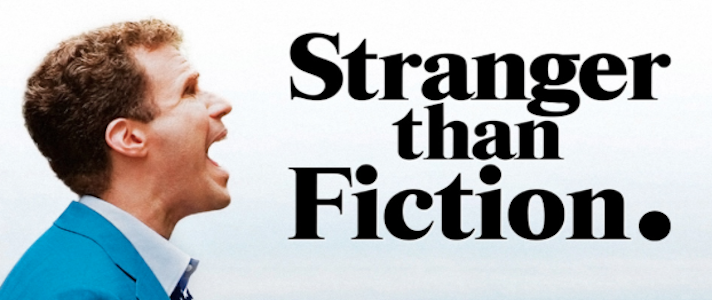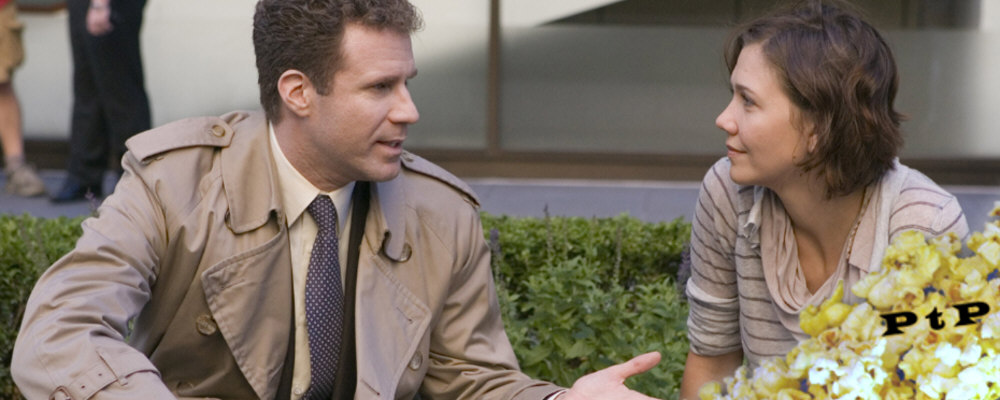
Stranger than Fiction tells the tale of an I.R.S auditor who find himself the subject of a mysterious narration, as it begins to affect his entire life, he goes on a mission to find out what is happening before it ends in his death.
The movie begins with the narrator saying that this is a story about a man named Harold Crick (Will Ferrell) and his wristwatch. It may seem odd at first the emphasis put on his wristwatch, but it’s of momentous importance to the ending. Harold has a special relationship with his wristwatch as everything he does is calculated to the second, commanded by his OCD personality. The movie shows how his brain works by displaying very precise graphics doing a great job at portraying his personality as he does his daily routines and goes about his life. The angles as he ties his tie, the amount of brushstrokes as he brushes his teeth, each step until the bust stop. His wristwatch is personified by his narrator, mentioning how it thinks the one knot Windsor that saves Harold times makes him look fat; how much it enjoys the crisp air outside as they caught their 8:17 bus every morning.
We learn from the narrator that Harold was lonely; he never spent time with any colleagues and kept a strict lifeless routine of work and going back home, going to sleep at precisely 11:13 every morning, alone. But on that Wednesday everything would change thanks to his Wristwatch, on that fateful day, his watch would stop and that would result on his imminent death. And that was the day he started hearing his narrator, throwing him off for a loop and making him miss the bus to work. Because of how disturbed he becomes his co-worker takes notice and gives him an easy audit – a baker. But as he arrives there to audit her, he finds himself enthralled by her – Ana Pascal (Maggie Gyllenhaal), and can barely focus on what he was there to do, especially with the hectic day he’d had so far.

We finally meet his narrator, Karen Eiffel, the writer, with dark bags under her eyes and a disheveled appearance, smoking cigarette after cigarette, it becomes obvious to us that she is not all that well. And indeed, she has writers block and is perturbed by how to continue her story – more specifically, how to kill her main character: Harold Crick.
Not hearing from his Narrator for a while and the last thing being how he would die, he tries, at home, to do things that would be narrated but to no avail. After going to the therapist and finding no resolution there, he goes to a literature professor, someone who might understand his plight, Professor Jules Hilbert (Dustin Hoffman).
After the professor’s advice to not do anything to move the plot forwards backfires on Harold, he is given the advice to live life to fullest, whatever he has left of it. And by doing so, his life improves, he starts interacting more with his friend, he no longer stays at home alone, starts to learn the guitar, and starts to slowly become more involved with Pascual, telling her bravely that he wants her.
But with all the happiness in his life, he realized he doesn’t want to die, and looks for more help from the Professor. They try to narrow down if his narrative is a tragedy or a comedy, if it’s a comedy he can count on a happy ending, if it’s a tragedy on the other hand… But on the Professor’s study, an interview by Karen Eiffel is playing on TV and he recognizes her voice almost immediately, much to his dismay because she only writers tragedy, she kills all her heroes. Unable to accept that, he goes on a hunt to find her and plead for his life! And that’s when the two storylines and realities collide, when he does meet her he finds out that she already outlined his death and she allows him to read it. Not being able to master up the courage to read it he asks the Professor to do it for him, which he agrees, as he is a big fan of Eiffel´s work. His conclusion to Harold is that he must die, as this is Karen´s masterpiece.
Unhappy with that decision, he sits on a bus all day and reads the entire manuscript, when he returns it to her he tells her that she should do it. That it is beautiful and she should finish. The struggle within Karen is obvious, finishing her work would mean the death of a real human being, and she even starts to wonder about her other books. The worst of all is that she only kills amazing people.
The movie ends with a beautiful message that when we get stuck in our own little world and lifeless routines, we miss a lot, and that when you start to realize that the smaller things in life aren’t just accessories to our days and we start to appreciate them.
XO,




